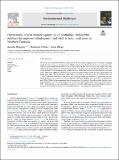| dc.description.abstract | The study was conducted in Northern Tanzania from the 2022–2023 cropping seasons to develop a cropping model that farmers can use to improve their lablab production. The field experiments were conducted at the Tanzania Agricultural Research Institute, Selian station and was laid down in a Split Plot Designs with main factor being tillage system and sub-factor being fertilizer type (Goat manure and Minjingu Nafaka Plus). The trials consisted of three treatments (goat manure, Minjingu Nafaka Plus and the control-no fertilizer) replicated thrice. There were significant differences (p=<0.001) among the number of pods per plant, plant height and lablab grain yield. The highest grain yield (3952 g and 3933 g) with net benefit of (1,290,210Tshs and 1,249,175Tshs) was recorded in a plot treated with (Minjingu Nafaka Plus) fertilizer in Conventional and Zero tillage system compared with (Goat manure) which had (3944 g and 3928 g) with net benefit of (1,306,710Tshs and 1,292,675Tshs) in Conventional and Zero tillage practices. Conclusively, the study revealed that there were high net benefits under zero tillage compared to conventional tillage based on input-output costs analysis at both TARI - Selian and Saweni sites. Zero tillage was more economically viable than conventional tillage practices as becomes more friendly for the resource-constrained farmers in increasing their potential yield. | en_US |

